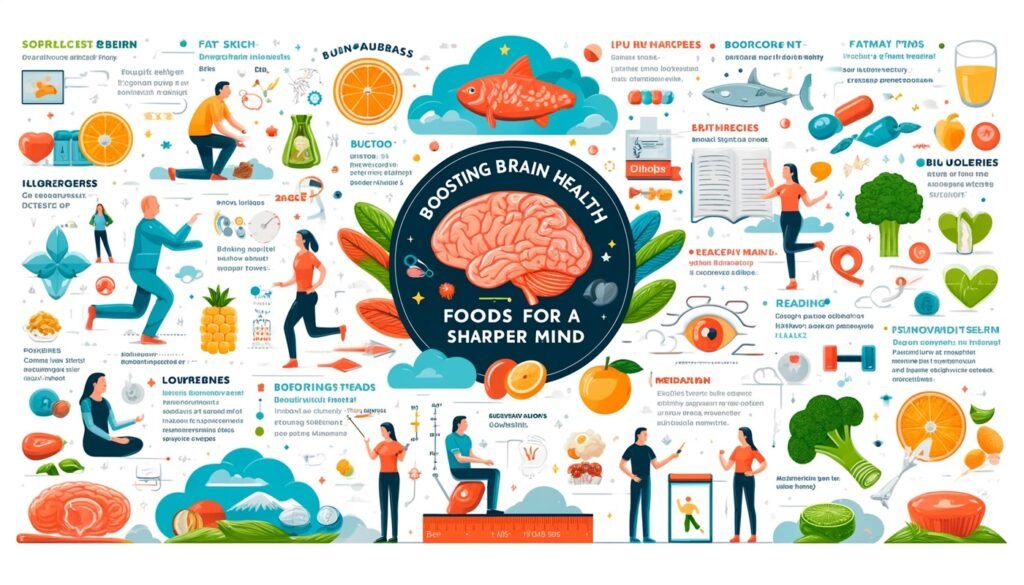
As we age, maintaining cognitive function and keeping our minds sharp becomes increasingly important. Fortunately, scientific research has identified numerous ways we can protect and enhance our brain health through diet and daily habits. This blog delves into the best foods and lifestyle practices to boost cognitive function and overall mental wellness.
Contents
Optimal Nutrition for Brain Health
Your brain is a powerhouse that requires a variety of nutrients to function optimally. Incorporating the following foods into your diet can significantly improve brain health:
- Fatty Fish: Rich in omega-3 fatty acids, fatty fish like salmon, trout, and sardines are crucial for brain health, aiding in building brain and nerve cells, and enhancing cognitive function.
- Blueberries: Often touted as a superfood for the brain, blueberries are packed with antioxidants that combat oxidative stress and inflammation, conditions that can contribute to brain aging and neurodegenerative diseases.
- Turmeric: This spice has powerful anti-inflammatory and antioxidant benefits. Curcumin, its active ingredient, can cross the blood-brain barrier and has the potential to improve memory and ease depression by boosting serotonin and dopamine levels.
- Broccoli: High in antioxidants and vitamin K, broccoli is considered one of the best brain foods. Vitamin K is essential in forming sphingolipids, a type of fat that’s densely packed into brain cells.
- Pumpkin Seeds: They contain antioxidants and a rich source of iron, zinc, magnesium, and copper. Each of these nutrients is important for brain health—for example, zinc is crucial for nerve signaling and magnesium is essential for learning and memory.
- Nuts and Seeds: A study has shown that nuts can improve markers of heart health, and having a healthy heart is linked to having a healthy brain.
Lifestyle Practices for Enhanced Cognitive Function
Beyond diet, several lifestyle practices can contribute to improved brain health:
- Regular Exercise: Physical activity increases blood flow to the brain and supports the production of hormones that enhance the growth of brain cells.
- Adequate Sleep: Sleep is critical for brain health. It flushes out brain toxins and supports learning and memory.
- Mindful Meditation: Meditation can reduce stress and pain, lower blood pressure, and even improve memory, primarily through its stress-lowering effects.
- Continuous Learning: Keeping your brain active by learning new skills, engaging in puzzles, or even playing instruments can help maintain its health and stave off cognitive decline.
Conclusion
Maintaining brain health is crucial for longevity and quality of life. By incorporating brain-boosting foods into your diet and adopting beneficial lifestyle habits, you can significantly enhance your cognitive functions and protect against degeneration. Remember, what’s good for the heart is often good for the brain—embrace a holistic approach to health and wellness.
FAQs about Boosting Brain Health
Q: How often should I eat brain-boosting foods?
A: Incorporating these foods into your daily diet can help you achieve the best results.
Q: Can physical exercise replace mental exercises for brain health?
A: While physical exercise has immense benefits for the brain, it’s most effective when combined with mental stimulation such as reading, puzzles, or learning new skills.
Q: Are there any negative effects of supplements for brain health?
A: It’s best to obtain nutrients from food sources when possible. However, consult with a healthcare provider before starting any supplement, especially if you have underlying health conditions.
Q: How much sleep do I need for optimal brain health?
A: Most adults need 7-9 hours of sleep per night. Consistency is also crucial, so try to go to bed and wake up at the same time every day.